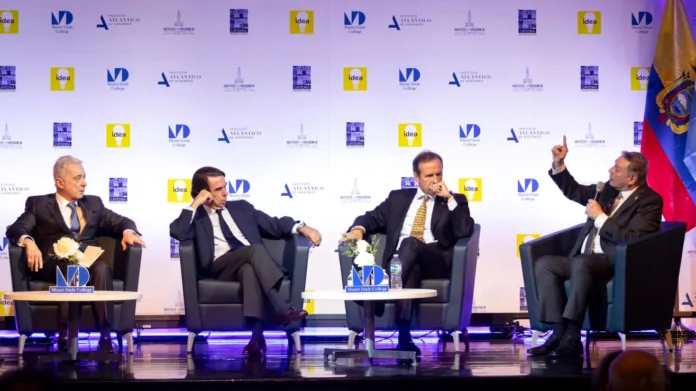Faced with the growing US military deployment in the Caribbean and the arrival of the country’s largest aircraft carrier, former Latin American presidents believe the end of Nicolás Maduro’s government is near.
Former leaders belonging to the IDEA Group met at Miami-Dade College (MDC) to discuss “the end of the dictatorships in Cuba, Nicaragua, and Venezuela.” They shared their opinions on the US military deployment following the arrival in the Caribbean of the USS Gerald R. Ford aircraft carrier and its strike group, comprised of 4,000 sailors and dozens of aircraft.
“The United States has a policy of combating drug trafficking and terrorism, of course, and I hope they understand that we are in decisive weeks,” responded former Bolivian President Jorge “Tuto” Quiroga (2001-2002) to a question from EFE.
The struggle for change in Venezuela faces a critical juncture, marked by the Nobel Peace Prize that Machado will receive in person in Norway on December 10, a “mobilized people,” and this “attitude of the American (United States) government,” Quiroga explained.
Machado, who last week called US President Donald Trump’s strategy against Maduro “absolutely correct,” stated today that her country faces “decisive hours,” affirming that “today Venezuela is on the threshold of freedom” and “an unprecedented transformation.”
“(I ask) you to join us in this historic moment, in its decisive hours, because what is happening in Venezuela is not just a national event, it is a turning point for all of Latin America,” Machado said virtually to the forum of former presidents.
Several former presidents defended the legitimacy of the United States’ attacks on alleged “narco-terrorist” boats, which have left some 75 dead and nearly 20 vessels attacked since September 1.
“I believe that a government that is maintaining itself by force must be understood as an international threat. A very serious mistake many countries made was defining drug trafficking as a public security problem,” former Ecuadorian President Jamil Mahuad (1998-2000) responded to a question from EFE.
The UN has accused these attacks of violating international law and constituting extrajudicial killings, while countries like France and Mexico have also questioned them, and Colombia and the United Kingdom have stopped sharing intelligence with Washington because of the bombings.
But former Colombian President Álvaro Uribe (2002-2010) stated that he prefers “the defeat of narcoterrorism to its continued advance and the creation of this sovereignty by criminals,” adding that his country also “runs the risk” of being bombed for “harboring terrorists” and being an “ally” of Venezuela.
“We run the risk that someone, in the name of defending their security, will also drop bombs on Colombian territory. This issue must be resolved. We are either with criminality, with neo-communism, with narcoterrorism, or we are with democracy,” the former president declared.
Luis Almagro, former Secretary General of the Organization of American States (OAS) from 2015 to 2025, also stated that he “does not question” the bombings of alleged drug-running boats because there is no “freedom of navigation or open skies for drug traffickers.”
“Security in the region must be preserved,” Almagro, now director of the Observatory for Democracy at the Casla Institute, told the media. “So, when those security conditions begin to be implemented, one cannot demand freedom of navigation, open skies for organized crime,” he added.






